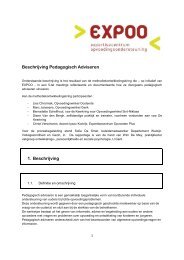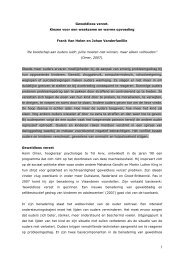Technique Is Not Enough (TINE) - British Psychological Society
Technique Is Not Enough (TINE) - British Psychological Society
Technique Is Not Enough (TINE) - British Psychological Society
- No tags were found...
You also want an ePaper? Increase the reach of your titles
YUMPU automatically turns print PDFs into web optimized ePapers that Google loves.
published a successful RCT in Norway where their programme is now being rolled outacross the country. FAST is currently being taken to scale in the UK in a partnership withSave the Children. These examples are being evaluated as they develop but longer termresults are so far very limited. Another example illustrates the longer term issue:FASTWisconsin (Anti-Drugs, 1990-2000) and California (Juvenile Delinquency Prevention 1994-2004)each sustained FAST for over $1million a year for over ten years across school districts and counties.South Carolina supported FAST state-wide into every elementary school for four years with a $6million a year initiative in children’s mental health prevention services, although that initiativeended when a new Governor was elected. In a follow-up study of the State of Wisconsin FASTinitiative, it was determined that following the three year state grants to a school district, there was aone third, one third, one third split around the outcome: one third of the districts continued toimplement FAST with all its core components intact using local tax dollars; one third altered corecomponents by dropping the parent partners, the cultural representation, the monthly booster sessionsfor two years, the collaborative multi-agency partnership and making it just a school programme,dropped the family meal, the singing, the eight weekly sessions to just three, and introduced lecturesto the parents rather than letting them find their own agendas. The last third dropped local fundingaltogether.In those Districts where changes were made these were not locally agreed culturaladaptations but examples of ‘model drift’. The majority of Districts that had earlierinvested enthusiastically in training, supervision and programme evaluation failed to reapthe long-term benefits of their investment. Failure to sustain programmes in this way limitsthe benefits only to the original participants and even then these benefits are likely to beshorter-term than where a programme is sustained as part of local community life.Curtailment also wastes money, good will and expertise. ‘Few preventive interventions“inoculate” the target population against (long-term) poor outcomes’ (Bumbarger &Perkins, 2008, p.60). In the start-up phase the budget incurs large one-off costs (training,materials, etc.) and the programme will not yet be operating optimally. In addition,stopping a programme can erode trust and goodwill in communities and can underminefuture efforts to implement other evidence-based programmes. Finally, it means that fewchildren and families experience an evidence-based programme, and for those that do thisis often only in the context of an RCT after which services return to normal. Tens ofthousands of children who might otherwise benefit are not being reached. The marketpenetration of Multi-Systemic Therapy, for example, is about one per cent (Little, 2010).In Wisconsin, after 10 years of continuing support, FAST was only available in 25 per centof the state’s 425 school districts.7.2. Why sustainability is hard to achieveBefore setting out some potential solutions, it helps to understand why the problem ofsustainability arises. Earlier we pointed out the many problems researchers face insuccessfully replicating model programmes in locations away from their place ofdevelopment or the original research site. The outcomes of many such replications turnout to deliver much less than their original research prowess would have promised(Bachrach, 1987; Mihalic et al., 2002). In practice the reasons for this are many and<strong>Technique</strong> <strong>Is</strong> <strong>Not</strong> <strong>Enough</strong> 57
















